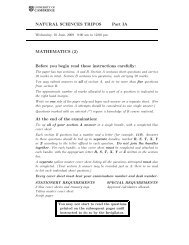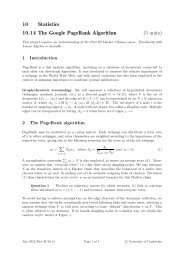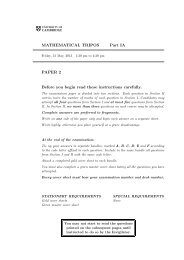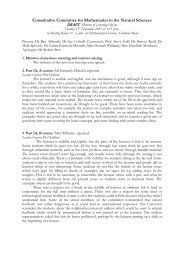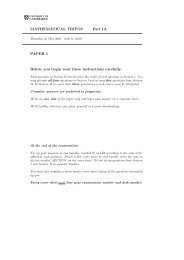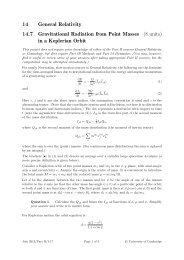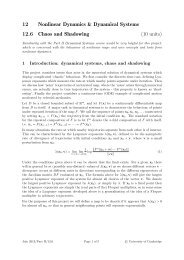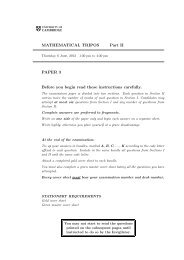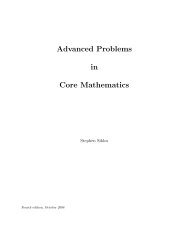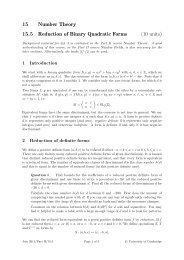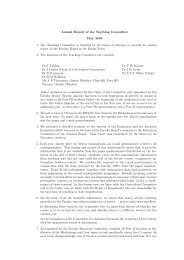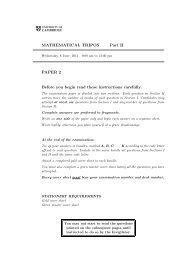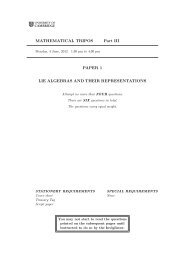Study Skills in Mathematics booklet - Faculty of Mathematics ...
Study Skills in Mathematics booklet - Faculty of Mathematics ...
Study Skills in Mathematics booklet - Faculty of Mathematics ...
Create successful ePaper yourself
Turn your PDF publications into a flip-book with our unique Google optimized e-Paper software.
UNIVERSITY OF<br />
CAMBRIDGE<br />
<strong>Faculty</strong> <strong>of</strong> <strong>Mathematics</strong><br />
STUDY SKILLS<br />
IN MATHEMATICS<br />
Handout for first–year students.<br />
All the documentation is available on the WWW<br />
(http://www.maths.cam.ac.uk/).<br />
September 25, 2012
1 Introduction<br />
Learn<strong>in</strong>g mathematics is very different from learn<strong>in</strong>g other subjects,<br />
as anyone who tries to read a mathematics text book soon f<strong>in</strong>ds out.<br />
And learn<strong>in</strong>g mathematics at university is very different from learn<strong>in</strong>g<br />
mathematics at school, as anyone who sits through a university<br />
lecture soon f<strong>in</strong>ds out. Intense is the word that spr<strong>in</strong>gs to my m<strong>in</strong>d<br />
when I try to describe the difference <strong>in</strong> style between school and<br />
university mathematics.<br />
Lectures are <strong>in</strong>tense compared with lessons because there are<br />
comparatively few <strong>of</strong> them; supervisions are <strong>in</strong>tense compared with<br />
lessons because you go over a week’s work <strong>in</strong> a s<strong>in</strong>gle hour; work is<br />
<strong>in</strong>tense because terms are much shorter (the 8 weeks loom<strong>in</strong>g ahead<br />
<strong>of</strong> you may seem an eternity, but I promise that <strong>in</strong> 8 weeks time you<br />
will be wonder<strong>in</strong>g what happened to the time); and exam<strong>in</strong>ations are<br />
<strong>in</strong>tense because you have to cram a year’s work <strong>in</strong>to 4 three-hour<br />
papers taken <strong>in</strong> the space <strong>of</strong> a few days.<br />
This <strong>booklet</strong> is <strong>in</strong>tended specifically for first year mathematicians;<br />
it was written for you. I hope that it will help you to make the<br />
most <strong>of</strong> your time at Cambridge.<br />
There is also a <strong>booklet</strong> that is specifically <strong>in</strong>tended for supervisors.<br />
You may well f<strong>in</strong>d it <strong>in</strong>terest<strong>in</strong>g and even useful to read the<br />
advice we give them on how to supervise. The pdf version is on the<br />
faculty web site:<br />
www.maths.cam.ac.uk/faculty<strong>of</strong>fice/supervisorsguide.<br />
Stephen Siklos,<br />
<strong>Faculty</strong> <strong>of</strong> <strong>Mathematics</strong>,<br />
Cambridge.<br />
1
2 Lectures<br />
The really big difference between school and university is <strong>in</strong> lectures.<br />
The lecturers have only 12 lectures a week <strong>in</strong> which to give you enough<br />
material to keep you occupied for the other 156 hours. Therefore, the<br />
material comes at you pretty fast.<br />
It follows that, whereas at school you probably expected to understand<br />
what the teacher said as it was said, here there will be great<br />
chunks <strong>of</strong> the notes which you will not understand until you have<br />
worked on them later: l<strong>in</strong>e by l<strong>in</strong>e, if necessary. Even then, there<br />
may be some parts <strong>of</strong> the course that only really come clear when<br />
you come to revise the material. 1<br />
Nevertheless, it is important to try to understand as much as<br />
possible <strong>of</strong> what is be<strong>in</strong>g said as it is said. Apart from sav<strong>in</strong>g time<br />
later, you may otherwise miss vital explanations and <strong>in</strong>sights. So:<br />
• Do make the effort to concentrate. 2 We have all heard that, <strong>in</strong><br />
a mathematics lecture, what the lecturer writes on the blackboard<br />
goes straight <strong>in</strong>to the student’s notebook without pass<strong>in</strong>g<br />
through the bra<strong>in</strong> <strong>of</strong> either. You should do everyth<strong>in</strong>g <strong>in</strong> your<br />
power to prevent this happen<strong>in</strong>g: sit near the front if you f<strong>in</strong>d<br />
50 m<strong>in</strong>utes <strong>of</strong> mathematics a stra<strong>in</strong>; don’t let your thoughts<br />
wander; and remember that concentration is just a matter <strong>of</strong><br />
self-discipl<strong>in</strong>e and practice.<br />
• Do ask questions dur<strong>in</strong>g the lecture rather than let someth<strong>in</strong>g<br />
pass by. If the lecturer is writ<strong>in</strong>g too fast, or too illegibly, or is<br />
speak<strong>in</strong>g too quietly for you, it is likely that others are hav<strong>in</strong>g<br />
the same difficulty.<br />
• Don’t be afraid to ask what you may th<strong>in</strong>k is a silly question.<br />
N<strong>in</strong>e times out <strong>of</strong> ten, most <strong>of</strong> the rest <strong>of</strong> the audience will be<br />
impressed (if only with your bravery) and many <strong>of</strong> them will<br />
1Reread this last paragraph! It is easy to become discouraged if you do not<br />
fully appreciate this message.<br />
2The bra<strong>in</strong> is a wonderful organ; it starts work<strong>in</strong>g the moment you get up<br />
<strong>in</strong> the morn<strong>in</strong>g and does not stop until you get <strong>in</strong>to the lecture theatre. Robert<br />
Frost (American poet 1874 – 1963).<br />
2
also want to know the answer. And it is just possible that the<br />
lecturer has made a mistake.<br />
• Do try to appear responsive: look up when you have f<strong>in</strong>ished<br />
writ<strong>in</strong>g and are ready for more (this helps the lecturer pace the<br />
lecture); look puzzled when you are puzzled (so that the lecturer<br />
knows when more explanation is required); allow a gleam <strong>of</strong><br />
recognition to surface if you suddenly realise what is go<strong>in</strong>g on.<br />
(Bob Hope, the American comedian, used to say that he liked<br />
British audiences, because even if they don’t feel like laugh<strong>in</strong>g<br />
at one <strong>of</strong> his jokes, they nod their heads to show that they have<br />
understood it.)<br />
The usual convention <strong>in</strong> lectures is that you write down exactly<br />
what the lecturer writes on the board or OHP. 3 You may f<strong>in</strong>d that<br />
you can supplement this a little dur<strong>in</strong>g the lecture but <strong>of</strong>ten there<br />
will not be time. Here are some very important trivialities:<br />
• Write the page number and lecture number on each sheet; if<br />
you drop your notes or get <strong>in</strong>to a muddle photocopy<strong>in</strong>g them,<br />
you will f<strong>in</strong>d that one page <strong>of</strong> mathematics looks very like any<br />
other. This may seem a ludicrously trivial po<strong>in</strong>t. A few years<br />
ago when there was a severe water shortage the water boards<br />
put out an advertisement tell<strong>in</strong>g everyone to turn <strong>of</strong>f the tap<br />
while brush<strong>in</strong>g teeth. The purpose was not just to save the<br />
cupful <strong>of</strong> water, but to put people <strong>in</strong> the right frame <strong>of</strong> m<strong>in</strong>d<br />
for mak<strong>in</strong>g other more significant sav<strong>in</strong>gs. You will f<strong>in</strong>d that<br />
number<strong>in</strong>g your pages will help with the overall orderl<strong>in</strong>ess that<br />
can be a great time saver.<br />
• Leave wide marg<strong>in</strong>s; you will certa<strong>in</strong>ly need to annotate when<br />
you go through later.<br />
• File your work (annotated lecture notes and supervision material)<br />
<strong>in</strong> an orderly way; this will save a lot <strong>of</strong> time when you<br />
come to revise.<br />
3 In some lectures, you will receive hand-outs rang<strong>in</strong>g from a summary to<br />
someth<strong>in</strong>g resembl<strong>in</strong>g a text book. You may still want to take notes <strong>in</strong> the<br />
lecture or make notes after the lecture.<br />
3
Here is the most important tip: you will save an immense amount<br />
<strong>of</strong> time if you always get to grips with one lecture before go<strong>in</strong>g<br />
to the next. This way, you will get much more out <strong>of</strong> the<br />
lectures, which will <strong>in</strong> turn save time when you go through your<br />
notes later. You should therefore set aside a slot each day for go<strong>in</strong>g<br />
through your lecture notes — not just read<strong>in</strong>g them, but work<strong>in</strong>g<br />
through them l<strong>in</strong>e by l<strong>in</strong>e. This is easy to say but hard to do; as soon<br />
as you fall beh<strong>in</strong>d it requires an enormous effort to catch up aga<strong>in</strong>.<br />
One f<strong>in</strong>al po<strong>in</strong>t. You may th<strong>in</strong>k that the lecturer is talk<strong>in</strong>g<br />
to you as a big group, but the lecturer actually sees a large<br />
number <strong>of</strong> <strong>in</strong>dividuals. You should extend to the lecturer<br />
the normal courtesies <strong>of</strong> an <strong>in</strong>dividual conversation; behave<br />
as if the lecturer is talk<strong>in</strong>g to you personally. Don’t, for<br />
example, spend the lecture chatt<strong>in</strong>g to your neighbour or<br />
read<strong>in</strong>g the newspaper. This is most distract<strong>in</strong>g for the<br />
rest <strong>of</strong> the audience and also for the lecturer, and is a sure<br />
recipe for a poor lecture. And please remember to turn<br />
<strong>of</strong>f your mobile phone <strong>in</strong> lectures; or, better still, leave it <strong>in</strong><br />
your room.<br />
3 Lectur<strong>in</strong>g styles<br />
You will f<strong>in</strong>d that lecturers adopt a range <strong>of</strong> strategies for convey<strong>in</strong>g<br />
to you the material listed <strong>in</strong> the schedules.<br />
For example, some lecturers work entirely on the blackboard or<br />
on overhead projectors; some give out a complete set <strong>of</strong> pr<strong>in</strong>ted notes;<br />
some cover theory (say) on the blackboard and give out the examples<br />
(say) on hand-outs; some give out notes with gaps for diagrams or<br />
equations to be filled <strong>in</strong> by you. Some styles will suit you better than<br />
others, but it is very much a personal matter; do not assume that<br />
others will agree with you about what is best.<br />
Often, students — especially first year students who are used<br />
to A-level learn<strong>in</strong>g methods — want complete pr<strong>in</strong>ted lecture notes,<br />
th<strong>in</strong>k<strong>in</strong>g that this is what they need to learn the material. That<br />
may be so, but the aim is to understand the material, which is a<br />
very different matter. For this, it may be much more useful to have<br />
4
a carefully distilled set <strong>of</strong> notes; the work you do <strong>in</strong> flesh<strong>in</strong>g out<br />
the details will serve you far better <strong>in</strong> the long run than read<strong>in</strong>g a<br />
complete set <strong>of</strong> pr<strong>in</strong>ted notes.<br />
4 Supervisions<br />
There is not much scope for heated discussion <strong>of</strong> topical issues <strong>in</strong><br />
mathematics supervisions. In fact, any debate at all is difficult, s<strong>in</strong>ce<br />
your op<strong>in</strong>ion seems not to count for much when your supervisor knows<br />
all the right answers (hav<strong>in</strong>g been told them by his or her supervisors<br />
when they did the course). I mentioned above that lectures are to<br />
some extent <strong>in</strong>teractive; this is very much the case with supervisions.<br />
A good part <strong>of</strong> the responsibility for mak<strong>in</strong>g the supervision useful<br />
and <strong>in</strong>terest<strong>in</strong>g lies with you. Remember that most supervisors are<br />
human be<strong>in</strong>gs too: they like you to talk to them and show an <strong>in</strong>terest<br />
(e.g. by ask<strong>in</strong>g questions) <strong>in</strong> what they are tell<strong>in</strong>g you.<br />
Generally, <strong>in</strong> a mathematics supervision, you sit at a desk with<br />
your supervisor who will write out solutions to exercises or explanations<br />
<strong>of</strong> pieces <strong>of</strong> mathematics on paper (not on a blackboard). You<br />
should not take notes yourself; leave your m<strong>in</strong>d completely free to<br />
concentrate on understand<strong>in</strong>g everyth<strong>in</strong>g your supervisor says. At<br />
the end <strong>of</strong> the supervision, you take away what he or she has written<br />
and (best) use it to annotate, correct or complete your own supervision<br />
work or lecture notes, or (second best) file it with your own work.<br />
Your supervision partner can use the notes after you, or photocopy<br />
them.<br />
If you f<strong>in</strong>d that you come away from the supervision without<br />
adequate notes, you should discuss the matter with the supervisor<br />
either by e-mail or at the beg<strong>in</strong>n<strong>in</strong>g <strong>of</strong> the next supervision. It is<br />
your supervision, so the supervisor should try to fit <strong>in</strong> with what<br />
you want.<br />
5
You must hand your work <strong>in</strong> well before the supervision.<br />
Your work should be neatly and clearly presented. If your<br />
work is scribbled and scruffy, then you should rewrite it. It<br />
should be logically and carefully argued otherwise it is not<br />
mathematics. You may th<strong>in</strong>k you can do a problem before<br />
you even set pen to paper, but you don’t know that you<br />
can do a problem until you write out all the details. Also,<br />
unless you are <strong>in</strong> the habit <strong>of</strong> writ<strong>in</strong>g careful solutions, you<br />
will come unstuck <strong>in</strong> the exam<strong>in</strong>ations when you do not<br />
have the opportunity to expla<strong>in</strong> what you really meant.<br />
If you do not make good use <strong>of</strong> supervisions, then you will squander<br />
one <strong>of</strong> the most important (and expensive) assets that Cambridge<br />
has to <strong>of</strong>fer. From long years <strong>of</strong> experience, I recommend that to make<br />
best use <strong>of</strong> your supervisions, you should:<br />
• br<strong>in</strong>g your lecture notes to the supervision, hav<strong>in</strong>g marked <strong>in</strong><br />
the bits you don’t follow;<br />
• hand your work <strong>in</strong> on time, so that it can be marked thoroughly;<br />
• mark your own work: make a note <strong>in</strong> the marg<strong>in</strong> wherever<br />
there is a step you are not sure <strong>of</strong>, or which you have missed<br />
out. I am not just tell<strong>in</strong>g you this to <strong>in</strong>gratiate myself with your<br />
supervisors, though it will undoubtedly make their lives easier:<br />
a self-critical approach to your own work will prove <strong>in</strong>valuable<br />
when it comes to exam time;<br />
• tell your supervisor (if appropriate and polite) exactly what you<br />
would like him or her to do — remember that sometimes your<br />
supervisor will have much less experience <strong>of</strong> supervisions than<br />
you, and will be glad <strong>of</strong> your advice;<br />
• make sure your supervisor writes down enough on each example<br />
for you to reconstruct the solution afterwards;<br />
• have an <strong>in</strong>telligent question ready <strong>in</strong> case the supervision is<br />
gr<strong>in</strong>d<strong>in</strong>g to a halt with time to spare;<br />
6
• review the supervision as soon as possible afterwards, while it<br />
is still fresh <strong>in</strong> your m<strong>in</strong>d.<br />
Last <strong>of</strong> all, here is the most important tip: do not be lazy.<br />
It is very easy to let what the supervisor is say<strong>in</strong>g just wash<br />
over you, perhaps hop<strong>in</strong>g that all will come clear later. If<br />
you don’t understand what the supervisor has done,<br />
say so.<br />
5 Supervision reports<br />
At the end <strong>of</strong> each term, each <strong>of</strong> your supervisors will lodge a report<br />
for you on CamCORS 4 . It has to be released by your Director <strong>of</strong><br />
Studies before you can read it: this is just a precaution, to cope with<br />
the extremely unlikely event <strong>of</strong> a completely <strong>in</strong>appropriate report, or<br />
a muddl<strong>in</strong>g <strong>of</strong> names, or some other disaster. You will receive an<br />
automatic e-mail as soon as a supervision report is available. It is<br />
important that you read your reports, and if they don’t appear to be<br />
there, ask your Director <strong>of</strong> Studies to <strong>in</strong>vestigate. Usually, they will<br />
appear (because supervisors are not paid until they file a report), but<br />
they might be late <strong>in</strong> which case they may arrive at a time when your<br />
Director <strong>of</strong> Studies is not expect<strong>in</strong>g them and will not release them<br />
without a prod from you.<br />
6 Guide for supervisors<br />
If you would like to see how the process <strong>of</strong> supervision looks from the<br />
‘other side’, you can see our (rather good) guide for supervisors:<br />
http://www.maths.cam.ac.uk/faculty<strong>of</strong>fice/supervisorsguide/<br />
.<br />
4 Cambridge Colleges Onl<strong>in</strong>e Report<strong>in</strong>g System; your Director <strong>of</strong> Studies will<br />
expla<strong>in</strong> about this.<br />
7
7 Methods <strong>of</strong> work<strong>in</strong>g<br />
Each <strong>of</strong> you will have to decide <strong>in</strong>dividually what method <strong>of</strong> work<strong>in</strong>g<br />
suits you: where to work, when to work, how to work. Only you can<br />
decide what is best for you. Some like to work <strong>in</strong> their rooms and<br />
some like to work <strong>in</strong> libraries away from temptations. Some like to<br />
work late <strong>in</strong>to the night and some prefer sleep at night. Clearly it is<br />
best to pace your work over the week or fortnight rather than to leave<br />
it to the last moment, especially as you cannot be sure how long the<br />
work will take.<br />
An important question to decide early on is whether you want to<br />
work alone or sometimes to get together with a friend. The essential<br />
th<strong>in</strong>g to remember if you work with someone else is that collaboration<br />
does not mean copy<strong>in</strong>g; it is f<strong>in</strong>e to discuss the work but you must<br />
have had a good go at it first and it should be an equal partnership<br />
with the aim <strong>of</strong> go<strong>in</strong>g further <strong>in</strong> the time available rather than halv<strong>in</strong>g<br />
the amount <strong>of</strong> time you need to spend on the work.<br />
However you work, you should remember that university mathematics<br />
should not be regarded as a competitive sport. No one is<br />
<strong>in</strong>terested <strong>in</strong> how quickly you managed to do the problems or your<br />
other achievements, and mak<strong>in</strong>g a big deal out <strong>of</strong> it can be very discourag<strong>in</strong>g<br />
for others not as clever (or who come <strong>in</strong>correctly to believe<br />
that they are not as clever) as you.<br />
8 Writ<strong>in</strong>g mathematics<br />
Most mathematicians can write accurate grammatical prose, they<br />
understand (for example) why the comma <strong>in</strong> this sentence should<br />
have been a full stop or a semi-colon. There is a grammar to writ<strong>in</strong>g<br />
mathematics as well. Symbols such as ∀, ⇒, ∃, etc, should be used<br />
<strong>in</strong> a way that makes grammatical sense if read out <strong>in</strong> full. If you are<br />
careless about this, then you will certa<strong>in</strong>ly f<strong>in</strong>d yourself us<strong>in</strong>g sloppy<br />
logic as well as sloppy mathematical grammar.<br />
You should try to write <strong>in</strong> full sentences, us<strong>in</strong>g normal punctuation:<br />
full stop at the end <strong>of</strong> a sentence even if it ends <strong>in</strong> an equation,<br />
commas normally <strong>in</strong> pairs, etc. Sentences should be short and as sim-<br />
8
ple as possible. If you f<strong>in</strong>d yourself writ<strong>in</strong>g paragraphs <strong>of</strong> text, then<br />
you should consider whether you are writ<strong>in</strong>g more than is necessary<br />
to expla<strong>in</strong> what you are do<strong>in</strong>g. 5<br />
You need to be absolutely precise <strong>in</strong> your mathematical writ<strong>in</strong>g. 6<br />
F<strong>in</strong>ally, remember that you are lay<strong>in</strong>g out your thoughts for<br />
someone else. You mustn’t th<strong>in</strong>k ‘Well, I’m sure he or she will know<br />
what I mean’. The reader may well be able to guess at what you<br />
mean but, if the reader is your exam<strong>in</strong>er, this may not get you your<br />
marks. In any case, why make your reader do the work?<br />
9 Solv<strong>in</strong>g problems<br />
<strong>Mathematics</strong> is all about problem solv<strong>in</strong>g and the only way to test<br />
your understand<strong>in</strong>g <strong>of</strong> the material is to work through examples. At<br />
school, problems were fairly short and the answers came out neatly.<br />
As an undergraduate, you will f<strong>in</strong>d that many problems take ages<br />
to do; even if you know exactly what you are do<strong>in</strong>g, each problem<br />
may take a considerable time and several sheets <strong>of</strong> A4 to complete.<br />
(This is as it should be: at research level, problems take months or<br />
years or may simply be unsolvable.) Another difference with school<br />
work is that here you will normally have only one problem on each<br />
topic, whereas at school there were normally many similar problems<br />
on each topic perhaps with different numbers <strong>in</strong> them 7<br />
Here are some thoughts on tackl<strong>in</strong>g problems.<br />
If you cannot get started on a problem, try the follow<strong>in</strong>g, <strong>in</strong><br />
order.<br />
• Reread the question to check that you understand what is wanted.<br />
• Reread the question to look for clues – the way it is phrased,<br />
or the way a formula is written, or other relevant parts <strong>of</strong> the<br />
5 Note: <strong>in</strong> this sentence, if is followed by then; it sounds a bit stilted here but<br />
you should always adhere to this rule <strong>in</strong> a mathematical sentence.<br />
6 Kev<strong>in</strong> Houston’s very nice book How to Th<strong>in</strong>k Like a Mathematician (Cambridge<br />
University Press, 2009) starts with the question ‘How many months have<br />
28 days?’ and then gives the mathematicians answer: ‘All <strong>of</strong> them’.<br />
7 The solutions to most problems are algebraic so the possibility <strong>of</strong> learn<strong>in</strong>g by<br />
tackl<strong>in</strong>g many problems differ<strong>in</strong>g only <strong>in</strong> the numbers used is no longer available.<br />
9
question. (You may th<strong>in</strong>k that the setters are try<strong>in</strong>g to set<br />
difficult questions or to catch you out; noth<strong>in</strong>g could be further<br />
from the truth. They are probably do<strong>in</strong>g all <strong>in</strong> their power to<br />
make it easy for you by try<strong>in</strong>g to tell you what to do).<br />
• Simplify the notation – e.g. by writ<strong>in</strong>g out sums or vector<br />
components explicitly.<br />
• Look at special cases (reduce the number <strong>of</strong> dimensions, choose<br />
special values which simplify the problem) to try to understand<br />
why the result is true.<br />
• Try to understand what it is that you don’t understand. For<br />
example, look up the def<strong>in</strong>itions <strong>of</strong> the technical terms – <strong>of</strong>ten<br />
this will open up new vistas.<br />
Make sure that you understand fully the technical<br />
terms used <strong>in</strong> the statement <strong>of</strong> the problem.<br />
10
• Look for a similar problem <strong>in</strong> your notes or <strong>in</strong> a textbook.<br />
But make sure that you understand fully the<br />
example you are work<strong>in</strong>g from.<br />
• Write down your thoughts – <strong>in</strong> particular, try to express the<br />
exact reason why you are stuck.<br />
Solv<strong>in</strong>g problems: write down your thoughts . . .<br />
• Go onto the next question and go back later.<br />
11
• Take a (short!) break. Littlewood (dist<strong>in</strong>guished Cambridge<br />
mathematician and author <strong>of</strong> the highly enterta<strong>in</strong><strong>in</strong>g Mathematicians<br />
Miscellany — dip <strong>in</strong>to it <strong>in</strong> your college library, ignor<strong>in</strong>g<br />
the last section if it is a recent edition) used to work<br />
seven days a week until an experiment revealed that when he<br />
took Sundays <strong>of</strong>f the good ideas had a way <strong>of</strong> com<strong>in</strong>g on Mondays.<br />
• Ask a friend (but make sure you still th<strong>in</strong>k it through yourself –<br />
friends are not <strong>in</strong>fallible). BUT: remember that follow<strong>in</strong>g someone<br />
else’s solution (whether by supervisor, lecturer or friend) is<br />
not remotely the same th<strong>in</strong>g as do<strong>in</strong>g the problem yourself.<br />
This is important: once you have seen someone else’s solution<br />
to an example, then you are deprived, for ever, <strong>of</strong> most<br />
<strong>of</strong> the benefit that could have come from try<strong>in</strong>g it yourself.<br />
Even if, ultimately, you get stuck on a particular problem,<br />
you derive vastly more benefit from see<strong>in</strong>g a supervisor’s<br />
solution to a problem with which you have already struggled,<br />
than by simply follow<strong>in</strong>g a solution to a problem to<br />
which you’ve given very little thought.<br />
If you have got started but the answer doesn’t seem to be com<strong>in</strong>g<br />
out then check your algebra. In particular, make sure that what you<br />
have written works <strong>in</strong> special cases. For example: if you have written<br />
the series for log(1 + x) as<br />
1 − x + x 2 /2 − x 3 /3 + · · ·<br />
then a quick check will reveal that it doesn’t work for x = 0; clearly,<br />
the 1 should not be there. 8<br />
You should also make sure that what you have written makes<br />
sense. For example, <strong>in</strong> a problem which is dimensionally consistent,<br />
you cannot add x (with dimensions length, say) to x 2 or exp x (which<br />
itself does not make sense). Even if there are no dimensions <strong>in</strong> the<br />
8 Another check will reveal that for very small positive x, log is positive<br />
(s<strong>in</strong>ce its argument is bigger than 1) whereas the series is negative, so there<br />
is clearly someth<strong>in</strong>g else wrong.<br />
12
problem, it is <strong>of</strong>ten possible to mentally assign dimensions and hence<br />
enable a quick check.<br />
Be wary <strong>of</strong> apply<strong>in</strong>g familiar processes to unfamiliar objects<br />
(very easy to do when you are feel<strong>in</strong>g at sea): for example, when deal<strong>in</strong>g<br />
with matrices, it is all too easy to write AB <strong>in</strong>stead <strong>of</strong> BA with<br />
nice simplifications <strong>in</strong> view; or to solve the vector equation a.x = 1<br />
by divid<strong>in</strong>g both sides by a. If your calculations seem to be all right,<br />
then go over the steps above.<br />
If you are not stuck, then:<br />
• Write out the solution fully; it is not good enough just to glance<br />
at an example and skip it if it looks easy.<br />
• Look back over what you have done, check<strong>in</strong>g that the arguments<br />
are correct and mak<strong>in</strong>g sure that they work for any special<br />
cases you can th<strong>in</strong>k <strong>of</strong>. It is surpris<strong>in</strong>g how <strong>of</strong>ten a cha<strong>in</strong><br />
<strong>of</strong> completely spurious arguments and gross algebraic blunders<br />
leads to the given answer.<br />
• Make sure that you are not unth<strong>in</strong>k<strong>in</strong>gly apply<strong>in</strong>g mathematical<br />
tools which you do not fully understand. 9<br />
• Try to see how the problem fits <strong>in</strong>to the wider context and see<br />
if there is a special po<strong>in</strong>t which it is <strong>in</strong>tended to illustrate.<br />
• Make sure that you actually understand not only what you have<br />
done, but also why you have done it that way rather than some<br />
other way. This is particularly important if you have worked<br />
9Mathematicians should feel as <strong>in</strong>sulted as Eng<strong>in</strong>eers by the follow<strong>in</strong>g<br />
joke.<br />
A mathematician, a physicist and an eng<strong>in</strong>eer enter a mathematics contest,<br />
the first task <strong>of</strong> which is to prove that all odd number are prime. The<br />
mathematician has an elegant argument: ‘1’s a prime, 3’s a prime, 5’s a<br />
prime, 7’s a prime. Therefore, by mathematical <strong>in</strong>duction, all odd numbers<br />
are prime. It’s the physicist’s turn: ‘1’s a prime, 3’s a prime, 5’s a prime,<br />
7’s a prime, 11’s a prime, 13’s a prime, so, to with<strong>in</strong> experimental error,<br />
all odd numbers are prime.’ The most straightforward pro<strong>of</strong> is provided<br />
by the eng<strong>in</strong>eer: ‘1’s a prime, 3’s a prime, 5’s a prime, 7’s a prime, 9’s a<br />
prime, 11’s a prime . . . ’.<br />
13
from a similar example <strong>in</strong> the notes (or if you sought advice<br />
from a friend).<br />
10 Exam<strong>in</strong>ations<br />
In the Tripos’s heroic period, at the end <strong>of</strong> the n<strong>in</strong>eteenth century,<br />
candidates had to sit through 36 hours <strong>of</strong> extremely hard papers.<br />
One year <strong>in</strong> the 1880’s, the maximum possible mark was 33,541 and<br />
the Senior Wrangler (that is, the man who came top <strong>of</strong> the list 10 )<br />
scored 16,368, i.e. about half marks, which works out at roughly<br />
8 marks/m<strong>in</strong>ute. The Wooden Spoon (that is, the man who came<br />
bottom <strong>of</strong> the pass list) amassed a grand total <strong>of</strong> 247.<br />
Nowadays, the exam<strong>in</strong>ations are much more friendly, be<strong>in</strong>g designed<br />
to test your knowledge <strong>of</strong> the courses you have attended rather<br />
than your ability to jump through mathematical hoops. Nevertheless,<br />
strategy matters. Extreme marks (either high or low) are available <strong>in</strong><br />
mathematics exam<strong>in</strong>ations, which means that play<strong>in</strong>g the cards you<br />
hold to best advantage is <strong>of</strong> vital importance.<br />
Here are some thoughts; you’ve heard them all before, but that<br />
does not make them any less worth say<strong>in</strong>g. The exam<strong>in</strong>ations may be<br />
some way <strong>of</strong>f, but you will f<strong>in</strong>d that good exam<strong>in</strong>ation technique can<br />
be acquired over the course <strong>of</strong> the year by mak<strong>in</strong>g suitable preparations<br />
and develop<strong>in</strong>g good habits. (For example, the first two po<strong>in</strong>ts<br />
assume that your year’s work is <strong>in</strong> good order.)<br />
• For revision, work through examples while read<strong>in</strong>g the relevant<br />
section <strong>of</strong> your notes (just read<strong>in</strong>g is not enough).<br />
• For last m<strong>in</strong>ute preparation, look through your supervision<br />
work to rem<strong>in</strong>d yourself how to do questions.<br />
10 I say ‘man’ because women were not eligible for the BA degree until 1946.<br />
However, women were permitted to sit the exam<strong>in</strong>ations and the convention was<br />
that the exam<strong>in</strong>ers would announce between which to male candidates they had<br />
come. The convention had to be modified <strong>in</strong> 1890 when Philippa Fawcett came<br />
top <strong>of</strong> the list — so not between two male candidates. It was agreed to announce<br />
that she had come ‘above the Senior Wrangler’.<br />
14
• In the exam<strong>in</strong>ation, above all, stay cool – if it is hard for you,<br />
it is probably hard for everyone.<br />
• Don’t rush <strong>in</strong>to a question – read the whole paper carefully and<br />
start with the question you feel most confident about.<br />
• Analyze exactly what you are be<strong>in</strong>g asked to do; try to understand<br />
the h<strong>in</strong>ts (explicit and implicit); remember to dist<strong>in</strong>guish<br />
between terms such as expla<strong>in</strong>/prove/def<strong>in</strong>e/etc.<br />
• Remember that different parts <strong>of</strong> a question are <strong>of</strong>ten l<strong>in</strong>ked (it<br />
is usually obvious from the notation) and choice <strong>of</strong> variables.<br />
• Set out your answer legibly and logically (don’t scribble down<br />
the first thought that comes <strong>in</strong>to your head) – this not only<br />
helps you to avoid silly mistakes but also signals to the exam<strong>in</strong>er<br />
that you know what you are do<strong>in</strong>g (which can be effective even<br />
if you haven’t the foggiest idea what you are do<strong>in</strong>g).<br />
• If you get stuck, state <strong>in</strong> words what you are try<strong>in</strong>g to do and<br />
move on (at A-level, you don’t get credit for merely stat<strong>in</strong>g<br />
<strong>in</strong>tentions, but university exam<strong>in</strong>ers are generally grateful for<br />
any sign <strong>of</strong> <strong>in</strong>telligent life).<br />
15
Solv<strong>in</strong>g problems: some problems may have hidden depths.<br />
11 Feedback<br />
You will have plenty <strong>of</strong> opportunities to express your views. Please<br />
use them, even if it is too late for you to benefit. Lecturers<br />
want to give you the best course possible and welcome constructive<br />
feedback on both style and content. You must share the responsibility.<br />
Towards the end <strong>of</strong> each course, the lecturer will distribute questionnaires<br />
and allow a little time <strong>in</strong> one lecture for you to fill them<br />
<strong>in</strong>. There will also be an electronic questionnaire at the end <strong>of</strong> the<br />
year. In addition, you can at any time e-mail the faculty hotl<strong>in</strong>e<br />
(hotl<strong>in</strong>e@maths.cam.ac.uk); hotl<strong>in</strong>e will either deal with your comment,<br />
or pass your e-mail to the relevant person.<br />
In all cases:<br />
• Try to be specific.<br />
16
• Make comments which the lecturer can act on.<br />
• Resist the temptation to be rude and/or clever.<br />
• Resist the temptation to make personal comments about the<br />
lecturer and his or her appearance. 11<br />
• Bear <strong>in</strong> m<strong>in</strong>d that it takes a great deal <strong>of</strong> time and effort and<br />
thought to produce a lecture course plus examples sheets and<br />
handouts.<br />
• Remember that you are only giv<strong>in</strong>g op<strong>in</strong>ion: even if you hated<br />
the course others may have enjoyed it.<br />
• Be aware that a course you found dull or <strong>in</strong>coherent or difficult<br />
may seem very different when you come to revise it.<br />
• Bear <strong>in</strong> m<strong>in</strong>d that some aspects <strong>of</strong> the course may depend on<br />
the syllabus as well as on the way the lecturer chose to <strong>in</strong>terpret<br />
it.<br />
The follow<strong>in</strong>g comments are taken from questionnaires from recent<br />
years ago (NB lecturers change after about 3 years). Judge for<br />
yourself which ones are useful. (and note that some tell us more<br />
about the student than about the course or lecturer).<br />
Algebra and Geometry, Michaelmas 199N, Dr X:<br />
1. Although the lecturer would pla<strong>in</strong>ly be happier teach<strong>in</strong>g classics, he<br />
should remember that he is very obviously not qualified to do so and<br />
should perhaps attempt to provide clear teach<strong>in</strong>g <strong>of</strong> mathematics<br />
<strong>in</strong>stead. Valid pro<strong>of</strong>s would also be welcomed.<br />
2. Dr X was brilliant. [NB: same lecturer and lecture course as the<br />
comment above.]<br />
3. Good <strong>in</strong>troduction to group theory that possibly went a bit fast.<br />
11 Although if you have found some <strong>of</strong> his or her mannerisms distract<strong>in</strong>g, you<br />
might want to mention it. A rare exception to the rule: when a pr<strong>of</strong>essor <strong>in</strong> Texas<br />
took to lectur<strong>in</strong>g <strong>in</strong> a cowboy hat, one <strong>of</strong> the evaluation forms had the comment<br />
‘All hat, no cattle’. Which is pretty funny and probably not unk<strong>in</strong>d.<br />
17
4. The course appears difficult to start with but is actually not too bad<br />
once read through a few times. The pr<strong>in</strong>ted notes were a good idea.<br />
5. Excellent lectur<strong>in</strong>g and an <strong>in</strong>terest<strong>in</strong>g subject. I felt that some <strong>of</strong><br />
the pro<strong>of</strong>s were a little wordy and not precise enough.<br />
6. I found the abstract ideas difficult to understand. The lecturer made<br />
it worse by us<strong>in</strong>g the word ‘trivial’ and giv<strong>in</strong>g no explanation when<br />
I thought it was far from trivial.<br />
<strong>Mathematics</strong> for NST, Easter 199N, Dr S<br />
1. The Fourier lectures were <strong>in</strong>comprehensible and go<strong>in</strong>g slower would<br />
have made no difference as the lecturer was crap.<br />
2. Excellent course, excellent lecturer. Can he lecture all the courses?<br />
3. The section on matrices was a bit slow.<br />
4. The little anecdotes were very <strong>in</strong>terest<strong>in</strong>g/amus<strong>in</strong>g.<br />
5. Dr S was brilliant. Handouts very useful. Sometimes the writ<strong>in</strong>g on<br />
the overheads was unclear.<br />
6. The lecturer left long pauses which tended to break my concentration.<br />
7. Too many pro<strong>of</strong>s; not enough worked examples.<br />
12 And f<strong>in</strong>ally . . .<br />
<strong>Mathematics</strong> is difficult. However, it is no more difficult than anyth<strong>in</strong>g<br />
else – just difficult <strong>in</strong> a different way. Most people cannot read a chapter<br />
<strong>of</strong> a maths book and expect to end up with a decent understand<strong>in</strong>g <strong>of</strong> the<br />
material. It has to be worked at, l<strong>in</strong>e by l<strong>in</strong>e. Don’t be discouraged: it is<br />
just a different way <strong>of</strong> learn<strong>in</strong>g and no worse than the wad<strong>in</strong>g through <strong>of</strong><br />
hundreds <strong>of</strong> <strong>of</strong>ten contradictory textbooks that many <strong>of</strong> your friends will<br />
have to suffer. And there are few more satisfy<strong>in</strong>g (academic) achievements<br />
than the successful pro<strong>of</strong> <strong>of</strong> a tricky mathematical proposition.<br />
18



